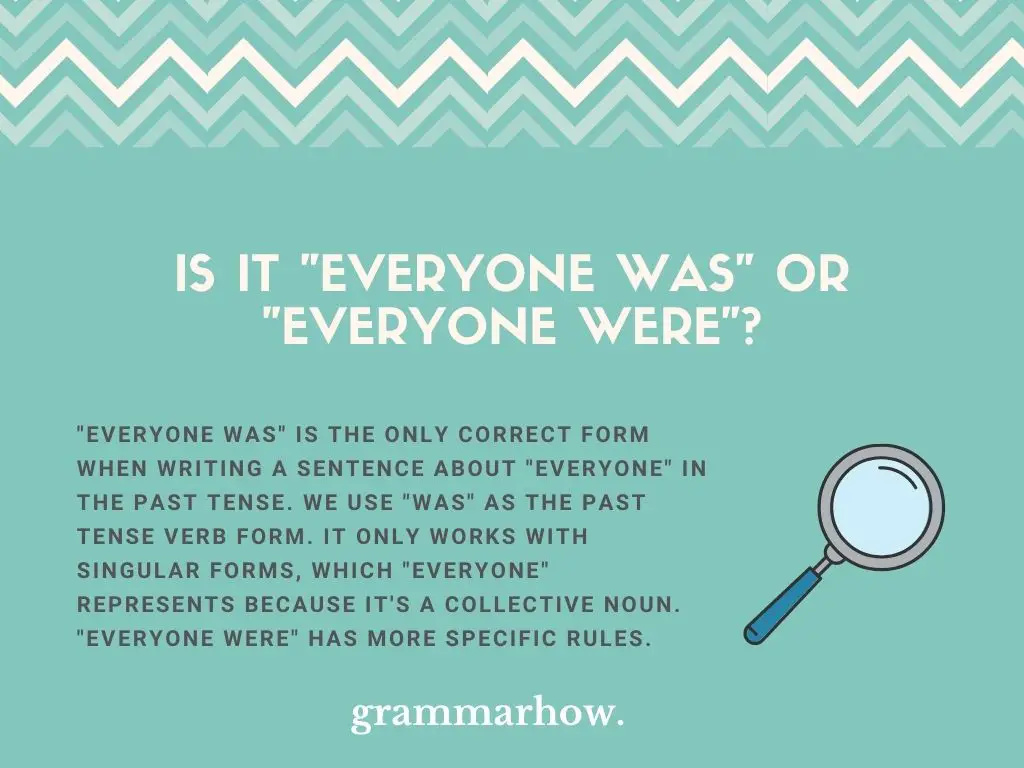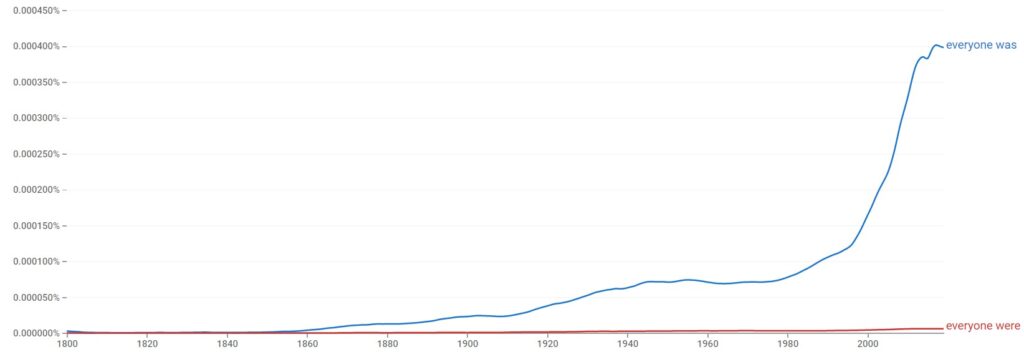“Was” works best when working with singular noun forms. We can use “everyone was” in almost all cases in writing. However, there are some instances where “everyone were” is correct, and it would help to know how this works. That’s what this article will help you with.
Is It “Everyone Was” Or “Everyone Were”?
“Everyone was” is the only correct form when writing a sentence about “everyone” in the past tense. We use “was” as the past tense verb form. It only works with singular forms, which “everyone” represents because it’s a collective noun. “Everyone were” has more specific rules.

We can only use “everyone were” when we are talking about our wishes or expressing potential things in the future.
It’s common for words like “if” or “I wish” to come before “everyone were.” This allows us to set up a possibility that may never come true. “Everyone was” could also apply when expressing possibilities, but it’s more informal to use “was” in these cases.
When Should I Use “Everyone Was”?
“Everyone was” works best in most cases. We use this form because “everyone” is a singular noun. It’s a collective form, meaning that we refer to everyone within the group as part of a larger group. Thus, it’s one entity.
“Was” is the singular verb form choice. We use it with other singular nouns, so it also makes sense to include it with “everyone.” This is standard English, and it’s the most expected (and correct) choice to come across.
- Everyone was going to be there to see it. I think they all decided to leave last minute, though.
- I thought everyone was in the mood for this. Clearly, I was wrong about that.
- Everyone was supposed to arrive earlier than this. I’m not sure when they’re going to get here.
- That’s why everyone was late. It was because of this stupid traffic jam outside the factory.
- I think everyone was here before me. They’ve all left, which I should have expected.
- Everyone was talking at the same time. It made it harder for us to hear each other.
- Everyone was there. I had such a good time at the party! I hope I can do it again!
When Should I Use “Everyone Were”?
“Everyone were” isn’t common or expected in standard sentence structures. However, it is still grammatically correct in some instances. We only use “were” with a singular form like “everyone” when we are expressing a wish or possibility (i.e. starting a sentence with “if”).
These rules apply no matter what form we are using in English. If a sentence starts with “if” or “I wish” (or anything similar), then you can expect to see “were” come after.
- If everyone were here, then I wouldn’t have had to put everything away.
- I wish everyone were there right now. I would make this so much more fun.
- If everyone were going to be here, maybe I would have been able to figure things out.
- If everyone were staying late, I would have packed more drinks for them all.
- I wish that everyone were still here. I miss all of my friends from my old school.
- I wish that everyone were around today. They’ve all moved on to bigger and better things without me.
- If everyone were just easier to talk to, I’m sure I’d have plenty of friends by this stage in my life!
Is “Everyone Was” Or “Everyone Were” Used The Most?
According to Google Ngram Viewer, “everyone was” is by far the most popular choice. This makes sense, considering that “was” works best with singular noun forms. “Everyone” is treated as a singular noun because of its collective properties.

With that said, there are some instances (albeit rare) where “everyone were” is used. This proves that we can use “everyone were,” but it’s uncommon. It applies to much fewer contexts, as we can only use “were” to express possibilities that might have happened.
Is It “I Wish Everyone Was” Or “I Wish Everyone Were”?
“I wish everyone were” is best because we use “I wish” to make a wish. We use “were” in this case because it expresses a possibility of something happening, even if that thing is incredibly unlikely. You can use “I wish everyone was” as well, but it’s a more informal choice.
- Informal: I wish everyone was still here right now. Then I’d be having more fun.
- Formal: I wish everyone were my friends. I have so much love to give, but nobody to give it to.
Is It “Everyone Was Happy” Or “Everyone Were Happy”?
“Everyone was happy” is the only correct form when referring to “everyone” as a group of people. We use “was” because “everyone” is a singular, collective noun that refers to one group. “Everyone were happy” only works with words like “if” or “I wish” before it.
- Everyone was happy before you came along. You sucked all of the fun out of the room.
- If everyone were happy, then they wouldn’t be going to these meetings.
Is It “Everyone Was Present” Or “Everyone Were Present”?
“Everyone was present” is correct in almost all cases. We use it to show that “everyone” is treated as a singular group. “Was” works whenever we use it in this way. Again, “everyone were present” only works when expressing wishes or beliefs in things.
- Everyone was present for the meeting. That’s why we managed to start so much earlier than planned.
- I wish every were present already. I’m so tired of having to wait around for them.
Is It “Everybody Was” Or “Everybody Were”?
“Everybody” and “everyone” follow the same general rules. “Everybody” is also a collective noun, meaning it’s treated as a singular entity. “Everybody was” is going to be more useful in most contexts. “Were” only applies when expressing wishes.
- Everybody was going to be there! It would have been the hottest party of the summer.
- If everybody were here, I wouldn’t be talking to you, would I?
- I think everybody was going home by that point. That’s why it was starting to get quiet.
- I wish everybody were still around. I really miss a lot of my old friends.
You may also like:
Everyone Is or Are – Is “Everyone” Singular or Plural?
“Everyone Has” or “Everyone Have” – Correct Version
Everyones, Everyone’s, or Everyones’? (Possessive Explained)

Martin holds a Master’s degree in Finance and International Business. He has six years of experience in professional communication with clients, executives, and colleagues. Furthermore, he has teaching experience from Aarhus University. Martin has been featured as an expert in communication and teaching on Forbes and Shopify. Read more about Martin here.
